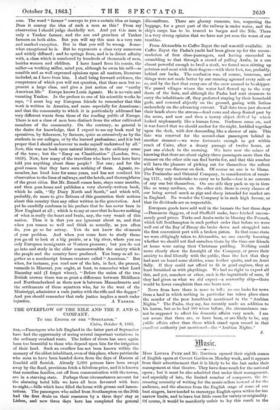THE OVERFLOW OF THE NILE AND THE P. AND O.
COMPANY. •
To THE EDITOR OF THE "SPECTATOR."
Cairo, October 8, 1863. Sur,—Passengers who left England in the latter part of September have had the opportunity of seeing several important variations in the ordinary overland route. The father of rivers has once again been too bountiful to those who depend upon him for the irrigation of their land. Such an overflow has not been known within the memory of the oldest inhabitant, even of this place, where patriarchs who seem to have been handed down from the days of Haroun al Ilaschid still flourish. Already 3,000 persons have been swept away by the flood, provisions fetch a fabulous price, and it is known that countless families, cut off from communication with the towns, are in a starving state. Perhaps these circumstances account for the alarming hotel bills we have all been favoured with here to-night,—bills which have filled the house with groans and lamen- tations. The passengers who sailed from Southampton on the 20th had the first drain on their resources by a three days' stay at Lisbon, and now three days here has completed the general
discomfiture. There are gloomy rumours, too, respecting the baggage, for a great part of the railway is under water, and the ship's cargo has to be trusted to barges and the Nile. There is a very strong opinion that we have not yet seen the worst of our troubles.
From Alexandria to Caffre Zayat the rail was still available. At Caffre Zayat the Pasha's yacht had been given up for the accom- modation of first class-passengers, and having succeeded in scrambling to that through a crowd of yelling Arabs, in a sun almost powerful enough to broil a steak, we found men stirring up potatoes and meat with their fingers—with their feet, too, probably, behind our backs. The confusion was, of course, immense, and things were not made better by our running aground every mile or so, and by the fact that every one of the crew seemed to be skipper. We passed villages where the water had flowed up to the very doors of the huts, and although the Pasha had sent steamers to carry the inhabitants off, they preferred staying by their household gods, and cowered abjectly on the ground, gazing with listless melancholy on the advancing current. Tall date trees just showed their heads above the stream—dead cows and sheep floated past by the score, and now and then a tawny object drifted by which looked unpleasantly like a human form. Darkness came ou, and it was feared that we should anchor for the night, huddled together upon the deck, with dew descending like a shower of rain. This fate was reserved for the second-class passengers behind in another steamer—we were fortunate enough to get within reach of Cairo, after a dreary passage of twelve hours, at past one o'clock in the morning. We have now the solace of knowing that there are about eighty-three passengers more than the steamer on the other side can find berths for, and that this number will have the pleasure of picking out for themselves the softest plank they can discover on deck. Of course no one is to blame. The Peninsular and Oriental Company, in consideration of receiv- ing 1171., only undertake to carry us to India—how is no concern of any one but themselves. On one side they pack us up in tiers like so many sardines, on the other side there is every chance of our being served much as pigs and sheep intended for market are in England. No wonder the Company is in such high favour, or that its dividends are so respectable.
European goods have sold well in the bazaars the last three days
—Damascus daggers, of real Sheffield make, have fetched uncom- monly good prices. Turks and Arabs unite in blessing the Poonah, which left Southampton in such perfect order that before we were well out of the Bay of Biscay she broke down and struggled into the first convenient port with a broken piston. In that same state we were obligingly taken to Alexandria, no one exactly knowing whether we should not find ourselves there by the time our friends at home were eating their Christmas pudding. Nothing could more clearly show the foresight of the Company, or prove their anxiety to deal liberally with the public, than the fact that they had sent on board some skittles, some leather quoits, and an Aunt Sally. if they could not afford to fit in good engines, they at least furnished us with playthings. We had no right to expect all this, and yet, somehow or other, such is the ingratitude of man, if they had given us what we did expect—a seaworthy ship—there would be fewer complaints than one hears now.
News from here there is none to tell ; no one looks for news from a land in which nothing in particular has taken place since the murder of the poor hunchback mentioned in the "Arabian Nights." The Pasha, they say, has recently made an addition to his harem, but as he had 300 wives before, the circumstance can- not be supposed to affect his domestic affairs very much. I am not aware that there are, or have been, or are likely to be, any public affairs other than those which stand upon record in that excellent authority just mentioned—the "Arabian Nights."
J.






























 Previous page
Previous page